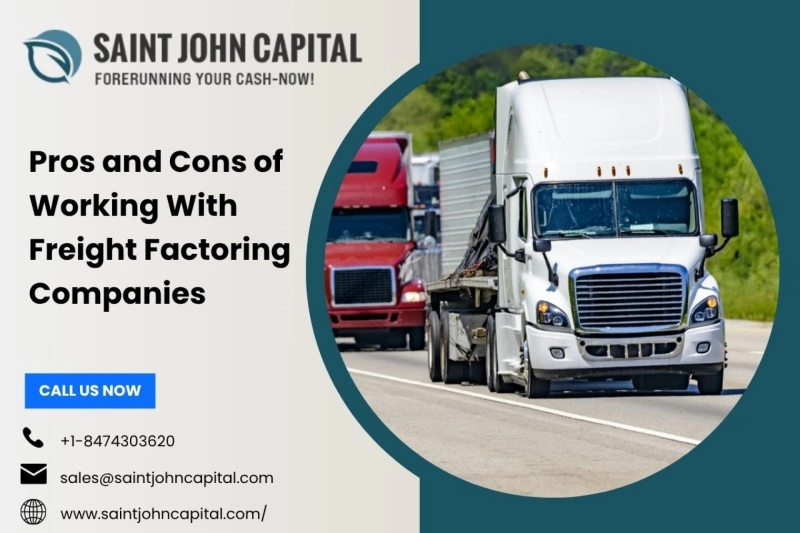Working with freight factoring companies sure comes with tons of benefits, but what happens when you do not map out all the aspects of the partnership? In most cases, owners of freight companies struggle with the service when their clients fail to make payments and they have to pay out of their pocket to the factoring service. However, making an informed decision on whether or not you wish to work with a factoring service, and if so, then which one, requires a thorough and calculated decision to maximize business profits.
These are the very subjects we shall be covering here, so you can understand fully what freight factoring is, and the pros and cons it comes with, so you can choose what works best for you, your capital, and operations too.
What is Freight Factoring?
The process of factoring your invoices with freight factoring companies requires a freight business to transfer all or part of its unpaid invoices to a factoring company to receive instant cash that is nearly equal to the amount shown on the invoices. It is a relatively easy and fast process because the freight company receives the amount immediately or within twenty four hours.
Next, to understand how large fleet freight factoring services work, you will only need to understand the four-step process of freight factoring, where the entire process is as follows:
Step 1: Delivery and BOL Collection
In this step, the consignment is picked by the transport company and delivered to the customer and a signed bill of lading (BOL) is obtained from the client.
Step 2: Forwarding the Invoices
The freight factoring company receives the invoice and the BOL and the carrier is left to decide whether to submit all invoices or only certain ones.
Step 3: Receiving the Cash Immediately or the Same Day
The factoring company looks at the invoice and BOL and analyses the financial background to decide on the percentage of the invoice which they will pay to the company in just 24-48 hours.
Step 4: Receiving the Remaining Amount
The factoring company receives the entire payment once the invoice is paid by the recipient of goods and subsequently after collecting a small percentage of the total invoice value, they pay the rest to you.
Pros and Cons of Working With Freight factoring Companies
Freight factoring is a decision that surely simplifies the process of acquiring working capital but can often leave some people stuck in a contract that doesn’t fulfill their requirements. Now let us understand the pros and cons to freight invoice factoring so you can understand every aspect and make an informed and calculated decision:
1. Cash Flow
Pro: You get instant cash for your unpaid invoices within just 24-48 hours of submitting the invoice and BOL, which helps cover operational expenses like payrolls, maintenance, fuel costs, and more.
Con: The service isn’t for free as you lose some amount from the invoice value to pay the freight factoring companies, and this cost is set by them without giving you much of a choice.
2. Debt and Financing
Pro: When you receive cash in exchange for the invoice, which is not an asset, you are not getting a loan, meaning there will be not debt on you balance sheet, and also that you won't need to submit anything as a collateral
Con: The fact that you are selling your invoices for quick cash means that you will not be able to use them as a collateral if you wish to switch financing options, thus, your eligibility to borrow can be restricted.
3. Business Operations and Time Management
Pro: The factoring company you work with will handle processes and paperwork for invoicing, credit control, amount collection, and more to allow you to focus better on running the business than on handling complex paperwork.
Con: If your client faces any issues with the factoring service such as errors, queries, or disputes, it can damage your relationship with the client, making it likely for them to stop the funding. Your factoring service is also well within their right to reject certain invoices from a particular client if they are deemed high-risk, which can interrupt your cash flow.
4. Risk Mitigation
Pro: Certain factoring services offer to run a background and credit check on your clients to help you vet them out if they seem incapable to make full and timely payment for their deliveries you make. In this case, non-recourse factoring acts as your line of defense in case the client fails to make a payment, then the factoring service bears the loss.
Con: When it comes to recourse factoring, which most freight businesses choose because of its low cost, it becomes your liability to pay for the losses incurred in case your client denies or fails to make the payment.
5. Customer and Client Relationships
Pro: In case your choice of the factoring service is a professional and polite one, your client relationships will improve and so will the efficiency of them completing the payments.
Con: Some clients may not find it suitable for them to work with a factoring service instead of the freight company itself, which can negatively impact your business relationship with them, especially if the factoring service is too aggressive.
Choosing Whether To Factor Your Invoices or Not
As a freight business, the decision of whether you wish to factor your invoices or not sets the trajectory for how you manage and receive your finances. But if you do end up wanting to choose one from the best freight factoring companies, just make sure that you choose the one which has experience with companies and clients like yours after fully understanding your needs, goals, and finances. All you need to do after is read the contract carefully and ask questions as you need to ensure their ability and intent.



